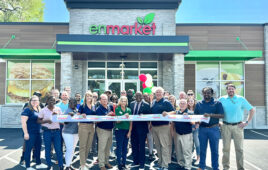Senate Majority Leader Harry Reid, (D-Nev.) and Sen. John Rockefeller, (D-W.Va.) announced that the Senate plans later today to begin work on expediting the reauthorization of the State Children’s Health Insurance Program (SCHIP), which could have a devestating impact on tobacco sales and profits.
The bill intends to retain coverage for 6.7 million enrolled children and include 3.9 million more uninsured children in the program, but Tom Briant, executive director of the National Association of Tobacco Outlets (NATO) is warning of “economic disaster” for state economies and American jobs should tobacco taxes be raised to fund the expansion of SCHIP.
“The politicians in Washington who are pushing for a punitive 156% increase in cigarette taxes and even higher tax increases on other tobacco products will exacerbate the current deep recession through the loss of up to 117,000 union and non-union jobs and at least $1.8 billion annually in lost revenues for the states,” Briant said.
The SCHIP bill passed by the U.S. House of Representatives and the U.S. Senate is beginning several days of debate on the SCHIP bill starting today. Brian urged tobacco retailers to voice their oppostion to the bill in calls to the White House comment line at (202) 456-1111.
According to Briant, effective points to include are:
1. Give your name, the city and state where you live, and your occupation if you are employed by a retailer, wholesaler or manufacturer in the tobacco industry. If you are an owner of a retail store or wholesale business, provide that information and indicate how many people you employ.
2. Request that President Obama be a man of his word and keep his campaign promise to not raise taxes on any American earning less than $250,000 a year, and that would include not raising cigarette and tobacco taxes to fund SCHIP.
3. If you are concerned about the future of your business that sells tobacco products or your job, ask the President to be true to his word about saving and creating jobs rather than signing into law the single largest tax increase on a product in the history of the U.S., which will result in losing up to 117,000 industry jobs. Say how the floor stocks tax will financially cripple your business," Brian said.
4. If you purchase tobacco products, let President Obama know how the large price increases on cigarettes and tobacco products will impact you.
Future at Stake
The U.S. Labor Department reported earlier this month that the national unemployment rate jumped to 7.2% with another 524,000 jobs lost in December alone. Additional increases could boost those numbers significantly, NATO warned.
“Why would any member of Congress and President-Elect Obama support a huge tax increase that will only serve to put another 117,000 Americans out of work?” Briant said. “During these recessionary times, and as Obama has publicly stated, the government needs to do everything possible to protect and ‘save’ jobs plus stabilize existing sources of revenue.
“Using tobacco taxes to fund health care for the middle class would have just the opposite effect.”
Briant, whose organization represents tobacco retailers throughout the U.S., said, “Unlike Wall Street financial firms, the retailers, wholesalers and manufacturers of tobacco products, which employ almost 1.2 million Americans, are not asking for a government bailout, but we are asking that our chances for survival not be torpedoed by a huge tax hike in these turbulent economic times.”
When cigarette prices rise due to tax increases, legal tobacco sales decline. Lower sales mean lower profits for tobacco retailers and wholesalers, driving job losses. As legal sales decline, the states collect less revenue from both state tobacco excise taxes and sales taxes on these purchases.
The states also lose income from annual payments they receive from tobacco manufacturers through the Master Settlement Agreement (MSA), reached in 1998. To date, states have received more than $8 billion in MSA payments since 1998, but those payments are based on the number of cigarettes sold. As sales decline, MSA payments to the states decline.
“This tax increase will also give additional impetus to the illegal sales of tax-free tobacco products on the Internet and from the black market, which are already huge problems for law enforcement in many states,” Briant said. “This tax hike will be a ‘bailout’ for the smuggling industry, but not for legitimate small, family-owned retail and wholesale businesses.”
Concerns for Employee Safety
Briant noted that higher taxes also put the safety of retail and transport employees at risk. “Delivery truck drivers and retail store clerks are in danger when criminals target higher-priced tobacco products the way gangsters targeted alcohol during prohibition,” he said. “It’s not uncommon to hear of stores robbed only for the cigarettes – the cash register is left untouched.
“President-elect Obama also needs to be reminded that he promised during his campaign not to raise taxes on anyone making less than $250,000 a year,” Briant said. “Yet, virtually every smoker in the country makes less than $250,000 a year. Clearly, this huge tax increase would be a violation of the president-elect’s campaign promise.
“Congress and President-Elect Obama need to fund the expansion of SCHIP in a responsible manner without putting another 117,000 Americans on the unemployment rolls,” said Briant. The attached table provides the estimated loss of state excise tax revenue and MSA payments by state if the federal excise tax on cigarettes and tobacco products is increased.




